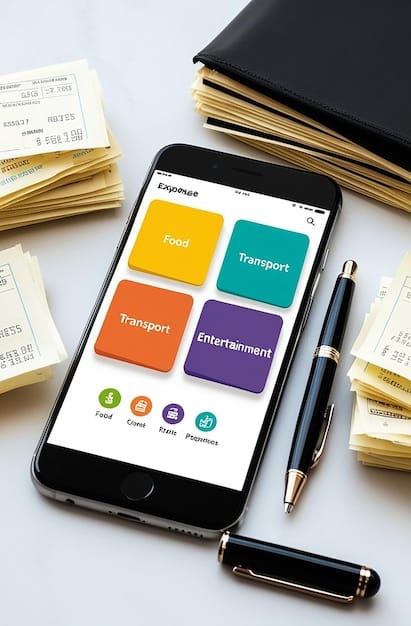Money Management for Freelancers: Tips for Handling Irregular Income

Money management for freelancers, who often face irregular income, involves budgeting, saving, and strategic planning to ensure financial stability and growth.
Navigating the world of freelancing comes with many perks, but it also presents unique financial challenges, especially when it comes to managing irregular income. Mastering money management for freelancers is crucial for long-term financial stability and peace of mind.
Understanding the Freelancer’s Financial Landscape
Freelancing offers freedom and flexibility, but it also means dealing with inconsistent paychecks. Unlike traditional employment, income can fluctuate wildly from month to month, making it essential to adopt a proactive approach to financial management. This involves understanding the unique challenges and opportunities that come with being self-employed.
The Feast or Famine Cycle
Many freelancers experience periods of high income followed by stretches of lean times. This “feast or famine” cycle can be stressful and make it difficult to plan for the future. Recognizing this pattern is the first step in developing strategies to smooth out income fluctuations.
Tax Implications for Freelancers
Freelancers are responsible for paying their own self-employment taxes, which include Social Security and Medicare taxes, in addition to federal and state income taxes. Failing to plan for these taxes can result in unexpected financial burdens and potential penalties.
- Track all income and expenses: Keep detailed records of all earnings and business-related expenses to accurately calculate taxable income.
- Set aside money for taxes: Aim to save 25-30% of each payment to cover estimated tax obligations.
- Consider quarterly tax payments: Paying estimated taxes quarterly can help avoid a large tax bill at the end of the year.
Successfully navigating the financial landscape requires a shift in mindset and the adoption of strategies tailored to the unique circumstances of freelance life. By understanding the challenges and implementing proactive measures, freelancers can achieve financial stability and build a secure future.
Budgeting Strategies for Irregular Income
Creating a budget is the cornerstone of effective money management for freelancers. However, traditional budgeting methods may not be suitable for those with variable income. It’s essential to adopt a flexible and adaptable approach.

The Zero-Based Budget
A zero-based budget involves allocating every dollar of income to a specific category, ensuring that total expenses equal total income. This method requires careful planning and tracking but can provide a clear picture of where your money is going.
The Envelope System
Using the envelope system, allocate cash to labeled envelopes for different spending categories. Once the money in an envelope is gone, no more spending is allowed in that category until the next budgeting period. This is especially useful for visual spenders.
- Track Expenses Diligently: Use apps or spreadsheets to monitor spending and identify areas where you can cut back.
- Prioritize Essential Expenses: Housing, food, and transportation should take precedence over discretionary spending.
- Allocate Funds for Variable Expenses: Estimate the average cost of variable expenses and set aside funds accordingly.
Budgeting with irregular income demands discipline, flexibility, and a willingness to adjust as needed. By implementing these strategies and staying committed to tracking expenses, freelancers can gain control of their finances and build a solid foundation for future growth.
Building an Emergency Fund
An emergency fund is a crucial safety net for freelancers. Given the unpredictable nature of freelance work, an emergency fund can help weather unexpected expenses or income droughts. It provides a sense of security and prevents you from going into debt during challenging times.
How Much to Save
Experts recommend having at least three to six months’ worth of living expenses in an emergency fund. This may seem like a daunting goal, but starting small and gradually increasing contributions can make it achievable.
Where to Keep Your Emergency Fund
Choose a high-yield savings account or money market account to keep your emergency fund safe and accessible. Avoid investing these funds in volatile assets like stocks or cryptocurrencies.
- Automate Savings: Set up automatic transfers from your checking account to your savings account each month.
- Treat it as Non-Negotiable: Avoid dipping into your emergency fund unless it’s a true crisis.
- Start Small: Even small contributions add up over time. Aim to save a percentage of each paycheck.
Building an emergency fund is an investment in your future financial security. It provides peace of mind and protects you from the unpredictable nature of freelance work. By prioritizing this goal and making consistent contributions, you can create a financial cushion that will serve you well during challenging times.

Managing Debt Effectively
Debt can be a significant obstacle to financial stability, especially for freelancers with irregular income. High-interest debt, such as credit card balances, can quickly spiral out of control and undermine your financial goals. Therefore, manage money management for freelancers including strategies to tackle existing debts.
Prioritize High-Interest Debt
Focus on paying off high-interest debt first to minimize interest charges and free up cash flow. Consider using the debt avalanche or debt snowball method.
Consider Debt Consolidation
Explore options for consolidating debt, such as a personal loan or balance transfer credit card, to potentially lower interest rates and simplify payments.
Effectively managing debt involves both proactive measures to prevent new debt and strategic approaches to paying down existing balances. By prioritizing debt reduction and making informed decisions, freelancers can improve their financial health and pave the way for a more secure future.
Investing for the Future
Investing is essential for building long-term wealth and securing your financial future. While it may seem challenging to invest with irregular income, it’s crucial to make it a priority. Investing allows your money to grow over time and provides a financial safety net for retirement and other long-term goals.
Retirement Accounts for Freelancers
Explore retirement account options such as SEP IRAs, SIMPLE IRAs, or solo 401(k)s. These accounts offer tax advantages and allow you to save for retirement on a tax-deferred or tax-free basis.
Diversify Your Investments
Spread your investments across a variety of asset classes, such as stocks, bonds, and real estate, to reduce risk and maximize potential returns. Consider using a robo-advisor to automate your investment strategy.
- Set Clear Goals: Determine your investment goals and risk tolerance to guide your investment decisions.
- Start Small: Even small investments can make a big difference over time. Start with what you can afford and gradually increase contributions.
- Reinvest Dividends: Reinvest any dividends or interest earned to accelerate the growth of your investments.
Investing for the future is a vital component of sound financial management. By prioritizing retirement savings, diversifying investments, and seeking professional advice, freelancers can build a secure financial future and achieve their long-term goals.
Tracking Income and Expenses
Accurate tracking of income and expenses is fundamental to effective money management. Without a clear picture of where your money is coming from and where it’s going, it’s impossible to make informed financial decisions. Freelancers need to implement systems for tracking their financial transactions to gain insights into their cash flow and profitability.
Use Accounting Software
Invest in accounting software like QuickBooks Self-Employed or FreshBooks to streamline your bookkeeping and track income and expenses automatically. These tools can also help you generate invoices and manage client payments.
Create a Spreadsheet
If you prefer a more hands-on approach, create a spreadsheet to record all income and expenses. Categorize transactions to identify spending patterns and track profitability.
- Set a Schedule: Dedicate time each week or month to reconcile your financial records and review your spending habits.
- Categorize Transactions: Use consistent categories to track expenses and identify areas for improvement.
- Monitor Key Metrics: Track metrics such as gross income, net income, and profit margin to gauge your financial performance.
Accurate tracking of income and expenses empowers freelancers to make informed financial decisions, optimize their business operations, and achieve their financial goals. By implementing efficient tracking systems and regularly reviewing their financial data, freelancers can gain control of their finances and build a thriving business.
Setting Financial Goals
Setting clear financial goals is essential for staying motivated and making progress toward your financial objectives. Whether it’s paying off debt, saving for retirement, or buying a home, having well-defined goals provides a roadmap for your financial journey. The **money management for freelancers** also needs this strategic roadmap.
Specific, Measurable, Achievable, Relevant, Time-Bound (SMART) Goals
Use the SMART framework to set goals that are specific, measurable, achievable, relevant, and time-bound. For example, instead of saying “I want to save more money,” set a goal like “I will save $500 per month for the next 12 months.”
Break Down Large Goals
Break down large goals into smaller, more manageable steps to stay motivated and track your progress. Celebrate milestones along the way to reinforce positive habits.
- Visualize Your Goals: Create a vision board or write down your goals to keep them top of mind.
- Share Your Goals: Share your financial goals with a trusted friend or family member for accountability and support.
- Review Regularly: Review your goals regularly and adjust them as needed based on changing circumstances.
Setting financial goals provides direction and motivation for your financial journey. By setting SMART goals, breaking them down into manageable steps, and regularly reviewing your progress, freelancers can achieve their financial objectives and build a secure future.
| Key Point | Brief Description |
|---|---|
| 📊 Budgeting | Create zero-based or envelope budgets for irregular income. |
| 💰 Emergency Fund | Save 3-6 months of living expenses in a high-yield account. |
| 💼 Tax Planning | Set aside 25-30% of income for taxes and consider quarterly payments. |
| 📈 Investing | Invest in retirement accounts and diversify assets for long-term growth. |
Frequently Asked Questions
▼
Focus on creating a flexible budget, such as zero-based budgeting, where you allocate every dollar of income to a specific category. Track your expenses diligently and adjust your budget based on income fluctuations.
▼
Aim to save at least three to six months’ worth of living expenses in your emergency fund. This will provide a financial cushion during periods of low income or unexpected expenses.
▼
Consider retirement account options like SEP IRAs, SIMPLE IRAs, or solo 401(k)s. These accounts offer tax advantages and allow you to save for retirement while reducing your current tax burden.
▼
Set aside 25-30% of each payment to cover estimated tax obligations. Consider making quarterly tax payments to avoid a large tax bill at the end of the year and potential penalties.
▼
Use accounting software like QuickBooks Self-Employed or create a spreadsheet to record all income and expenses. Categorize transactions to identify spending patterns and track profitability.
Conclusion
Mastering money management as a freelancer is essential for long-term financial stability and success. By implementing budgeting strategies, building an emergency fund, managing debt effectively, and investing for the future, freelancers can navigate the challenges of irregular income and achieve their financial goals. Take control of your finances today and build a secure future for yourself.





